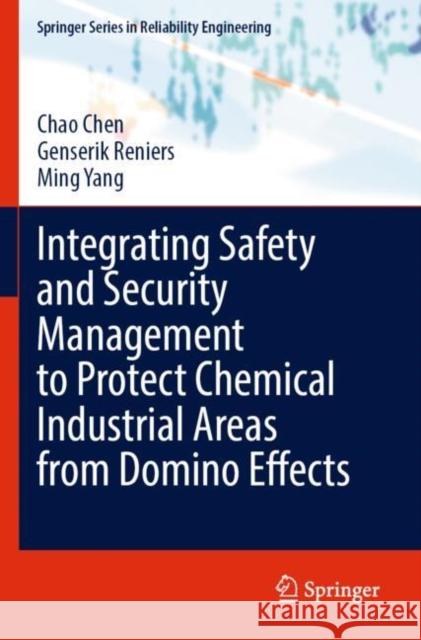Integrating Safety and Security Management to Protect Chemical Industrial Areas from Domino Effects » książka
Integrating Safety and Security Management to Protect Chemical Industrial Areas from Domino Effects
ISBN-13: 9783030889135 / Angielski / Miękka / 2022 / 184 str.
Integrating Safety and Security Management to Protect Chemical Industrial Areas from Domino Effects
ISBN-13: 9783030889135 / Angielski / Miękka / 2022 / 184 str.
(netto: 614,84 VAT: 5%)
Najniższa cena z 30 dni: 616,85
ok. 16-18 dni roboczych.
Darmowa dostawa!
This book provides insight into domino effects in industrial chemical sites and process industries. It is about the integration of safety and security resources to prevent and mitigate domino effects in the process industries. It explains how chemical industrial areas, comprised of various hazardous installations, are susceptible to a chain of undesired events, or domino effects, triggered by accidental events or intentional attacks and then presents solutions to prevent them.Firstly, the book provides a dynamic graph approach to model the domino effects induced by accidental fire or intentional fire, considering the spatial-temporal evolution of fires. Then, a dynamic risk assessment method based on a discrete dynamic event tree is proposed to assess the likelihood of VCEs and the vulnerability of installations, addressing the time dependencies in vapor cloud dispersion and the uncertainty of delayed ignitions. A dynamic methodology based on dynamic graphs and Monte Carlo is provided to assess the vulnerability of individuals and installations exposed to multi-hazards, such as fire, explosion and toxic release during escalation events. Based on these domino effect models, an economic approach is developed to integrate safe and security resources, obtaining the most cost–benefit protection strategy for preventing domino effects. Finally, a resilience-based approach is provided to find out the most cost-resilient way to protect chemical industrial areas, addressing possible domino effects.This integrated approach will be of interest to researchers, industrial engineers, chemical engineers and safety managers and will help professionals to new solutions in the area of safety and security.
This book provides insight into domino effects in industrial chemical sites and process industries. It is about the integration of safety and security resources to prevent and mitigate domino effects in the process industries. It explains how chemical industrial areas, comprised of various hazardous installations, are susceptible to a chain of undesired events, or domino effects, triggered by accidental events or intentional attacks and then presents solutions to prevent them.Firstly, the book provides a dynamic graph approach to model the domino effects induced by accidental fire or intentional fire, considering the spatial-temporal evolution of fires. Then, a dynamic risk assessment method based on a discrete dynamic event tree is proposed to assess the likelihood of VCEs and the vulnerability of installations, addressing the time dependencies in vapor cloud dispersion and the uncertainty of delayed ignitions. A dynamic methodology based on dynamic graphs and Monte Carlo is provided to assess the vulnerability of individuals and installations exposed to multi-hazards, such as fire, explosion and toxic release during escalation events. Based on these domino effect models, an economic approach is developed to integrate safe and security resources, obtaining the most cost–benefit protection strategy for preventing domino effects. Finally, a resilience-based approach is provided to find out the most cost-resilient way to protect chemical industrial areas, addressing possible domino effects.This integrated approach will be of interest to researchers, industrial engineers, chemical engineers and safety managers and will help professionals to new solutions in the area of safety and security.











